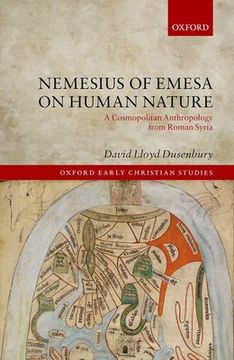Compartir
Nemesius of Emesa on Human Nature: A Cosmopolitan Anthropology From Roman Syria (Oxford Early Christian Studies) (en Inglés)
David Lloyd Dusenbury
(Autor)
·
Oxford University Press, USA
· Tapa Dura
Nemesius of Emesa on Human Nature: A Cosmopolitan Anthropology From Roman Syria (Oxford Early Christian Studies) (en Inglés) - Dusenbury, David Lloyd
$ 121.512
$ 202.519
Ahorras: $ 81.008
Elige la lista en la que quieres agregar tu producto o crea una nueva lista
✓ Producto agregado correctamente a la lista de deseos.
Ir a Mis Listas
Origen: Estados Unidos
(Costos de importación incluídos en el precio)
Se enviará desde nuestra bodega entre el
Viernes 21 de Junio y el
Viernes 05 de Julio.
Lo recibirás en cualquier lugar de Argentina entre 1 y 3 días hábiles luego del envío.
Reseña del libro "Nemesius of Emesa on Human Nature: A Cosmopolitan Anthropology From Roman Syria (Oxford Early Christian Studies) (en Inglés)"
Nemesius of Emesa's On Human Nature (De Natura Hominis) is the first Christian anthropology. Written in Greek, circa 390 CE, it was read in half a dozen languages--from Baghdad to Oxford--well into the early modern period. Nemesius' text circulated in two Latin versions in the centuries that saw the rise of European universities, shaping scholastic theories of human nature. During the Renaissance there were numerous print editions helping to inspire a new discourse of human dignity. David Lloyd Dusenbury offers the first monograph in English on Nemesius' treatise. In the interpretation offered here, the Syrian bishop seeks to define the human qua human. His early Christian anthropology is cosmopolitan. He writes, 'Things that are natural are the same for all.' In his pages, a host of texts and discourses--biblical and medical, legal and philosophical--are made to converge upon a decisive tenet of Christian late antiquity: humans' natural freedom. For Nemesius, reason and choice are a divine double-strand of powers. Since he believes that both are a natural human inheritance, he concludes that much is 'in our power'. Nemesius defines humans as the only living beings who are at once ruler (intellect) and ruled (body). Because of this, the human is a 'little world', binding the rationality of angels to the flux of elements, the tranquillity of plants, and the impulsiveness of animals. This compelling study traces Nemesius' reasoning through the whole of On Human Nature, as he seeks to give a long-influential image of humankind both philosophical and anatomical proof.
- 0% (0)
- 0% (0)
- 0% (0)
- 0% (0)
- 0% (0)
Todos los libros de nuestro catálogo son Originales.
El libro está escrito en Inglés.
La encuadernación de esta edición es Tapa Dura.
✓ Producto agregado correctamente al carro, Ir a Pagar.

